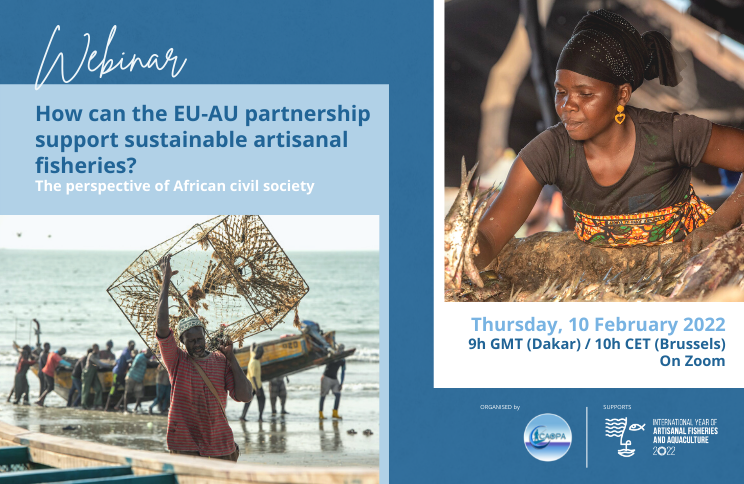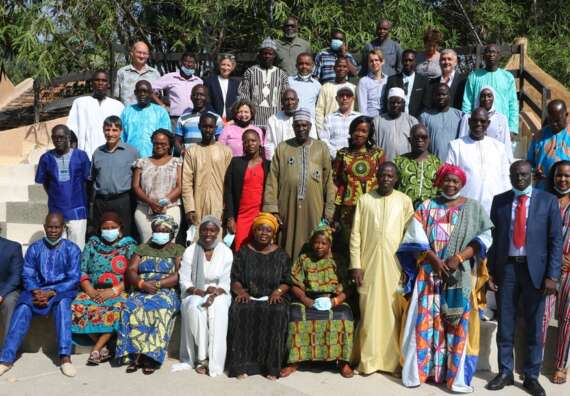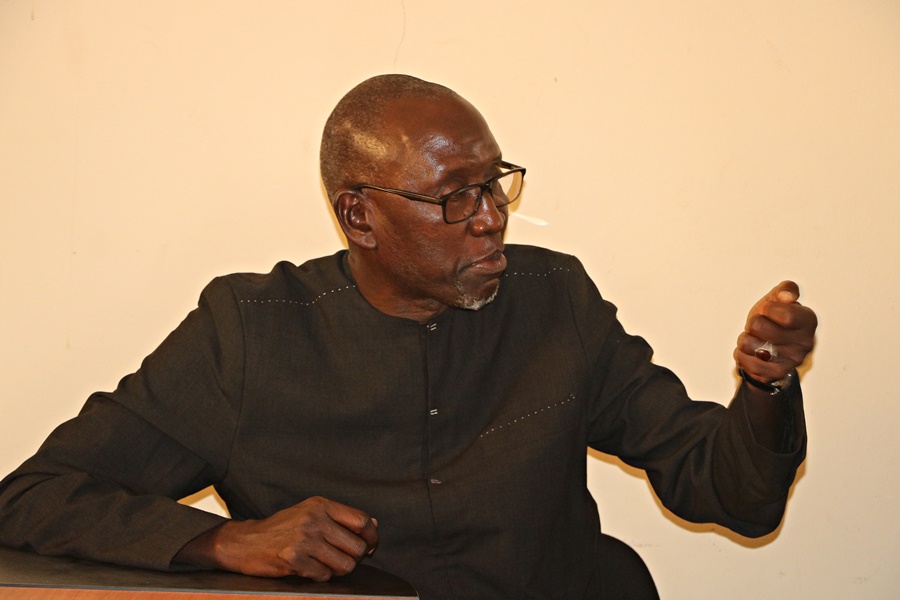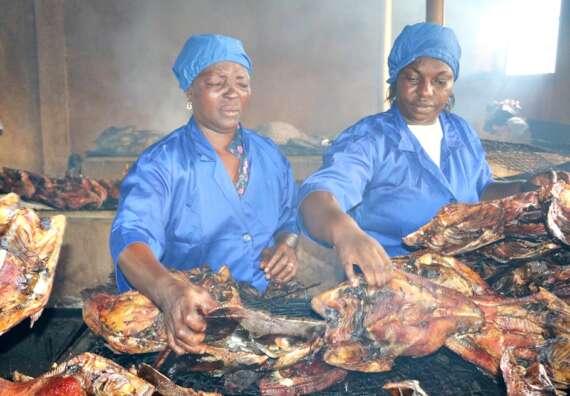The African Confederation of Professional Organizations of Artisanal Fisheries (CAOPA) is organizing a webinar on “How can the EU-AU partnership support sustainable African artisanal fisheries?” A viewpoint of African civil society.
 This webinar is being held on February 10th, 2022 on Zoom as a prelude to the EU-African Union Summit (Brussels) on February 17-18.
This webinar is being held on February 10th, 2022 on Zoom as a prelude to the EU-African Union Summit (Brussels) on February 17-18.
The objective is to give voice to African artisanal fisheries stakeholders and civil society to identify how partnership relations between Africa and Europe can help to support sustainable artisanal fisheries in Africa.
Thus, the President of CAOPA, Gaoussou GUEYE made a presentation of the priorities of his organization for the International Year for Artisanal Fisheries and Aquaculture (IYAFA 2022).
Mr. Gueye said: “Our concern today is the competition of other sectors included in the blue economy strategies, financially and politically more powerful, such as oil and gas exploitation, tourism, which endanger the future of artisanal fisheries.
We propose the entirety of his presentation.
Voice of Communities
– CAOPA represents the voice of men and women of the artisanal, maritime and continental fishing industry in 27 African countries.
– Together we define our advocacy and priorities action.
 – CAOPA has decided on its advocacy agenda for the International Year of Artisanal Fisheries and Aquaculture on World Fisheries Day in November 2021 in M’Bour/Senegal.
– CAOPA has decided on its advocacy agenda for the International Year of Artisanal Fisheries and Aquaculture on World Fisheries Day in November 2021 in M’Bour/Senegal.
– We pay particular attention to the issues of women in the sector who are present throughout the African artisanal fisheries sector.
Priority 1: Secure access to resources
States should grant exclusive fishing rights to artisanal fishers in coastal areas.
- 100% of these areas should be co-managed by the state and fishermen, and include appropriate ecosystem conservation tools, such as protected marine areas, or participatory monitoring systems.
- Safe access also means safety at sea. The signature and implementation of Convention 188 of the International Labour Organization (ILO) will help improve safety at sea for fishermen. The training of canoe captains, the use of new technologies (geolocation, etc.), and the awareness-raising among fishermen of safety issues are essential.
- For small pelagic fish, which are strategic for food security and are shared between several countries, States must put in place a concerted management system that gives priority to access to fishing for direct human consumption, rather than to the fishmeal and fish oil industry.
Priority 2: Promote the place of women in African artisanal fisheries
- Women’s participation in professional organizations and in decision-making processes must be strengthened. For example, when it comes to granting fishing licenses or location approvals to fishmeal factories that will deprive them of raw material for processing.
- Improving the working conditions of women in artisanal fisheries first requires investment in necessary services and infrastructure: clean water, electricity, drainage, sanitary facilities, etc. These will make possible to reduce post-harvest losses, improve the supply of raw materials to women, and provide processed products of better quality:

Fumeuses Guinée - Women are also involved in artisanal fish farming, which is a good way of supplementing their supply of raw materials, but also of coping with periods when fishing is stopped (biological rest, for example). Women’s initiatives in this sector should be supported.
- To facilitate trade in goods at national and regional levels, states should work to remove existing barriers, especially harassment of women along trade roads, particularly at borders between countries, which cause delays and loss of goods for women.
Priority 3: Protect African artisanal fisheries from competition with other sectors of the blue economy
- Fisheries is the largest blue economy sector in Africa
- “Our concern today is the competition from other sectors included in the blue economy strategies, financially and politically more powerful, such as oil and gas exploitation and tourism, which endanger the future of artisanal fisheries.
- The pollution of marine and coastal ecosystems by human activities, including plastic, is also a scourge for our communities. We need to promote the use of biodegradable materials, ban the use of single-use plastics that pollute our oceans, and invest in the treatment of the waste that litters our beaches and waters.
- The precautionary approach should guide the development of the blue economy. Independent and transparent social and environmental impact assessments must be carried out, with the participation of affected coastal communities.
- No new ocean use activity should be permitted by states, or supported by donors, if it negatively impacts ecosystems (e.g. oil pollution) and the activities of the communities that depend on them for their livelihood.
- Transparent mechanisms for consultation and conflict resolution between users of maritime spaces, which allow for informed and active participation of affected fishing communities, must be put in place in order to ensure that the blue economy benefits all.



